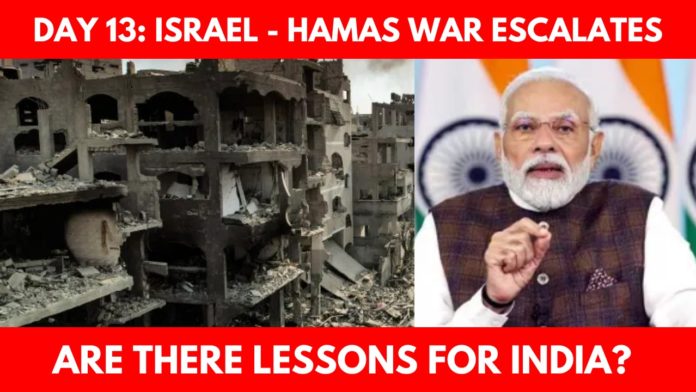Sagarika Mitra, Content Head of JAN KI BAAT analyses 8 factors that India can’t ignore as Israel – Hamas conflict escalates
Today is the thirteenth day of the Israel – Hamas war, the conflict is escalating by the minute. In a significant diplomatic outreach, Prime Minister Narendra Modi, spoke to the President of the Palestinian Authority, H.E. Mahmoud Abbas, and discussed critical issues pertaining to the Israel-Hamas war. Prime Minister Modi conveyed his heartfelt condolences for the tragic loss of civilian lives at the Al Ahli Hospital in Gaza, underlining India’s unwavering commitment to providing humanitarian assistance to the Palestinian people during these trying times. He expressed deep concern over the escalating terrorism, violence, and deteriorating security situation in the region. In reaffirming India’s longstanding principled stance on the Israel-Palestine issue, Prime Minister Modi stressed the nation’s dedication to promoting peace and stability in the conflict-ridden region.
While diplomatically India has taken a balanced and mature position in the ongoing conflict, by clearly drawing a distinction between Hamas and Palestine and by standing with Israel in its war against Hamas’ brutal terror – what are the lessons for India from this war? Let’s analyse multiple factors
1) Here’s what has caught the attention of the Indian Army:
A recent report in The Hindu said that the Indian Army is closely scrutinising the ongoing Israel-Hamas conflict, aiming to extract valuable lessons that can fortify India’s defense capabilities. Hamas’s utilization of power gliders, notably during their initial assault on October 7, has captured the attention of Indian defense experts. These gliders played a pivotal role in enhancing the element of surprise in Hamas’s attacks, enabling terrorists to circumvent ground-level barriers and penetrate Israeli territory with minimal hindrance.
2) Nawaz Sharif’s son in law’s reckless ‘N’ provocation
Recent statements made by Pakistani politician Captain Muhammad Safdar, who is also the son-in-law of former Prime Minister Nawaz Sharif and a leader of the Pakistan Muslim League (N), have raised alarms in India. Safdar openly called for jihad against India and Israel during a pro-Palestine rally in Peshawar, where he asserted that Pakistan’s nuclear weapons are meant for the “whole Muslim world.” These remarks have sparked concerns over the safety and responsibility associated with Pakistan’s nuclear arsenal.
Indian intelligence sources expressed their concerns regarding Safdar’s statements, suggesting that they indicate Pakistan’s nuclear weapons are in “unsafe and irresponsible” hands.
3) Lessons to learn from Israel’s Monumental Intel failures
The intelligence failure on the part of Israel’s vaunted intelligence agencies – Shin Bet, Mossad, and military intelligence – offers valuable insights and warnings for India. Hamas’ ability to launch a well-coordinated attack, 50 years after Israel’s surprise during the Yom Kippur War in 1973, has raised questions about Israel’s intelligence capability and vigilance. Intelligence agencies are tasked with not only gathering information but also interpreting intent. Hamas’ operation was far from spontaneous. It was pre-planned and intricately coordinated. The use of drones, bulldozers, bombs, paragliders, motorcycles, and golf carts to overrun border security suggests a high level of organization. This operation was a stark reminder that intelligence agencies must constantly adapt to evolving threats and not underestimate the capabilities of potential adversaries.
The Israeli intelligence community’s attention was seemingly diverted toward other fronts, particularly the North, where Hezbollah had stockpiled thousands of rockets, and the West Bank, which was experiencing escalating violence. Additionally, the rising tension surrounding Al-Aqsa Mosque had placed Israel’s focus on the potential for a third Intifada.
4) It’s imperative to not fall into the ‘Trap of Overconfidence’
This war has raised crucial lessons for India, spanning across the realms of national security, diplomacy, and international relations. In the aftermath of the abrogation of Article 370 in Jammu and Kashmir, a degree of overconfidence seemed to prevail, with some believing that the Kashmir issue had been largely resolved. However, the situation in the Indian subcontinent is far more complex, and India must exercise caution and vigilance on multiple fronts.
One of the key takeaways from the Israel-Hamas war is the danger of overconfidence. India cannot afford to underestimate the latent security threats that persist in its neighborhood. The ambush in Kokernag was purportedly an act of revenge for the killing of Lashkar-e-Taiba (LeT) commander Riyaz Ahmed, codenamed Qasim, in Pakistan-administered Kashmir.
5) Never undermine the enemy’s ability to pull off a deceptive facade:
One striking aspect of the October 7th attack on Israel, was how Hamas, managed to pull off a deceptive facade. Israel’s famed intelligence was taken by shock and surprise, as Hamas subtly portrayed itself as defeated and solely interested in financial gains. Behind this smokescreen, it was silently gearing up for a deadly assault.
This strategy of deceptive calm is something India should take heed of, especially at a time, when a hostile neighbour is globally projecting itself as a battered and weak nation.
6) Killing of anti India elements on foreign soil by ‘unknown gunmen’
In the last 19 months, 16 anti India terrorists have been eliminated by ‘unknown gunmen’ in Pakistan and Canada. Most of these men were known to be close to terror bosses like Hafiz Saeed and Maulana Masood Azhar. While these killings may be due to multiple reasons, including local rivalries and gang wars, they are perceived by Pakistanis as originating from India. It is essential to recognise that, these terror groups are known to retaliate. With the onset of winter, security apparatus shouldn’t take this relative calm lightly
7) Lashkar, Taliban & Khalistan: The collaboration threat is real
The United Nations Analytical Support and Sanctions Monitoring Team’s 13th report has revealed worrying connections between groups like LeT and the Taliban. This collaboration poses potential security challenges for India. Furthermore, the presence of Jaish-e-Mohammed (JeM) in training camps in Afghanistan under the Taliban’s control is alarming.
In India, much attention is focused on the so-called ‘Khalistan’ issue. While some believe that separatism has waned in Punjab, there are signs of support from some quarters. Recent pro Khalistan protests, in the backdrop of Hardeep Singh Nijjar issue, in multiple countries have shown significant planning and funding behind this movement, aiming to sow discord within India.
8) Security Challenges and Lessons for India
India, like Israel, faces multifaceted security challenges from its neighbors. The unresolved borders with both China and Pakistan, as well as the persistent threat of terrorism, require our utmost vigilance. There is a compelling argument for streamlining the numerous agencies responsible for border security under one unified command authority, enhancing coordination, and response times.
The lessons from the Israel-Hamas conflict emphasize the need for India to maintain the highest levels of military readiness at all times. Prolonged deployments and complacency can lead to delayed reactions, leaving troops vulnerable to unforeseen threats. Moreover, the security agencies and forces must prioritise safeguarding India’s territorial integrity and sovereignty, without becoming mired in internal issues.

